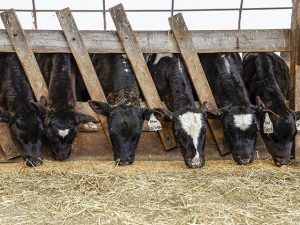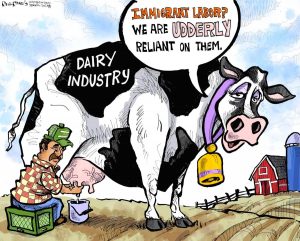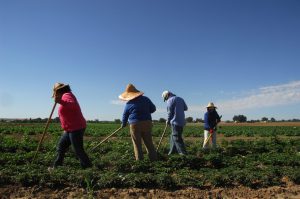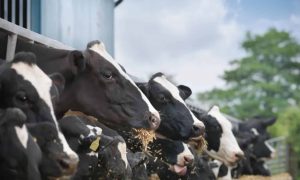
This Thanksgiving, there is a pretty good chance that the meal you share with family and friends is there because of migrant labor – including undocumented.
With mass deportations looming, alleged child sex scandals brewing, billionaire tech moguls poking around in the White House and so, so much more … the uneasiness in the air is thick this holiday season.
But for those who celebrate, Thanksgiving is a great opportunity to show some gratitude for the silver linings all around us.
As we fill our tables with carbs and meat and more amazing carbs this holiday, we at Daily Kos would like to extend our gratitude to the undocumented immigrant and migrant workers making these ingredients available at our local grocery stores.
The need for migrants to supply our food chain is undeniable—and even more so as convicted felon and President-elect Donald Trump promises mass deportations when he takes office.
“Mass deportations could affect our entire dairy industry throughout the U.S.,” Maine dairy farmer Jennifer Tilton Flood told Newsweek. “The idea of mass deportations is frightening and scary, just on a humane level, with regards to our community.”
The U.S. Department of Labor certifies a capped number of visas for incoming migrants every year under the H-2A visa program just to satisfy Americans’ hungry stomachs.
The H-2A program—which has garnered its own controversy among local farm workers—allows migrants seeking work to come into the U.S. temporarily to tend to our nation’s farms.
But the visa program alone hasn’t been able to meet farmers’ needs (or budgets). In the end, undocumented workers supply a portion of our agricultural industry’s additional demand for cheap laborers.
Here are some Thanksgiving favorites that, more likely than not, are possible thanks to undocumented migrants.
Apple pie
Virginia is one of the country’s top 10 states for supplying apples, producing “five to six million bushels” each year.
As for its workers, the state’s agricultural workforce relies on a “significant” number of undocumented workers to staff its farms, according to the Virginia Employment Commission.
Daily Kos reached out to Virginia employment officials for an updated number but did not receive a response.
This vague data set reflects at least 12,300 migrant workers who live in Virginia’s “350 migrant labor camps.” Notably, the Virginia Department of Health cited that the regulations on conditions at these camps—including AC, heat and clean water—have not been revisited “in over 20 years.”
Baked mac ‘n cheese
As it turns out, cheese is political.
California is one of the top dairy producers in the U.S., and the state with the largest migrant worker population.
LA Cooperativa released a report in 2023 revealing that 75% of California’s farm workers were undocumented immigrants.
While the West Coast state has historically advocated for workers’ rights, many of California’s farm workers (i.e., migrants) do not receive protections such as minimum wage, overtime pay, and other benefits.
Green bean casserole and mashed potatoes
Michigan is a big producer for beans, potatoes, dairy, and much more.
As the Detroit Free Press reports, the “not-so-secret truth” behind these agricultural giants is that a good chunk of their labor comes from undocumented and H-2A visa workers.
“We have multigenerational families and groups that have been coming to Michigan for years as migrant farmworkers. We have many seasonal farmer workers and year-round farmworkers and many, many of them are undocumented,” Susan Reed, director of the Michigan Immigrant Rights Center, told the outlet.
A 2023 report by the U.S. Department of Labor found that 42% of these agricultural workers were undocumented. And, of course, that statistic relies on people who are willing to admit to being undocumented.
Turkey
When it comes to the U.S.’s top turkey states, Minnesota is also migrant-reliant—and officials have openly acknowledged the state workforce’s dependency on migrants.
This state in particular saw a flood of migrants—some of them minors—working in meatpacking facilities across the state, sometimes being subjected to subhuman living conditions.
As for the numbers, Minnesota does not provide updated data on undocumented immigrants, but admitted to heavily relying on a H-2A visa program to fast-track migrants into temporary seasonal workers.
“I normally get about a resume a day from somewhere across the pond. Maybe from South America. Maybe from Mexico,” farm owner Pete Van Erkel told CBS News. “We need people.”
Daily Kos contacted the Labor Standards Unit in Minnesota for comment on undocumented workers but did not hear back.
You can now read the most important #news on #eDairyNews #Whatsapp channels!!!
🇺🇸 eDairy News INGLÊS: https://whatsapp.com/channel/0029VaKsjzGDTkJyIN6hcP1K























